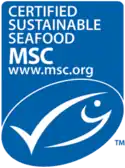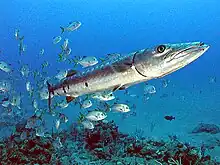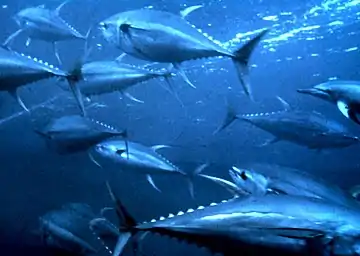Marine Stewardship Council
The Marine Stewardship Council (MSC) is a non-profit organisation which aims to set standards for sustainable fishing. Fisheries that wish to demonstrate they are well-managed and sustainable compared to the MSC's standards are assessed by a team of Conformity Assessment Bodies (CABs).
 | |
| Type | Nonprofit organization |
|---|---|
| Industry | Sustainable seafood labelling |
| Founded | 1996; London, United Kingdom[1] |
| Headquarters | Marine House, Snow Hill, London, EC1 |
Key people |
|
| Revenue | 29,300,000 euro (2020) |
Number of employees | c. 140 |
| Website | www |
| Footnotes / references [2] | |
The mission of the MSC is to use its ecolabel, for which the MSC receives royalties for licensing it to products, and fishery certification program to recognise and reward sustainable fishing practices.
The MSC has faced criticism in the past, mainly centering on its close ties to the fishing industry and conflict of interest stemming from royalties received by the industry for its certification label.
Contribution to changes in the oceans
When buyers choose MSC-certified fish, well-managed fisheries are rewarded for sustainable practices. In turn, the growing market for certified sustainable seafood generates a powerful incentive for other fisheries to demonstrate they are fishing sustainably or to improve their performance so that they too can be eligible for MSC certification. In this way, the MSC program helps to harness market forces to incentivise positive environmental change.[3]
Environmental benefits
A study commissioned and funded by MSC[4]: 746 found that MSC-certified fisheries show improvements that deliver benefits to the marine environment. Benefits included: increased stocks; improved management of stocks; reduced bycatch; expansion of environmentally protected areas; and increased knowledge about ecosystem impacts amongst fishers.[4] [5]
Key facts and figures
The MSC was founded in 1996, inspired by the Grand Banks cod fishery collapse. In 1999 it became independent of its founding partners, the World Wide Fund for Nature (WWF) and Unilever.[1] MSC has a staff of around 140 spread across the headquarters in London, regional offices in London, Seattle, Singapore and Sydney, and local offices in Edinburgh, Berlin, The Hague, Paris, Cape Town, Tokyo, Reykjavik, and the Baltic region.[6]
The MSC program is open to all fisheries regardless of size, scale, location and intensity and runs a Developing World Program to ensure equal access to the program.
As of February 2016, there are over 20,000 seafood products available with the MSC ecolabel, sold in around 100 countries around the world. As of May 2016, there are over 280 fisheries that have been independently certified as meeting the MSC's environmental standard for sustainable fishing and over 90 are currently undergoing assessment.[7] Around 3,300 companies operating in 34,500 sites have met the MSC Chain of Custody standard for seafood traceability.[8] The MSC works in partnership with a number of organisations, businesses and funders around the world but is fully independent of all.[2]
Standard for sustainable fishing
The MSC environmental standard for sustainable fishing was developed over two years through a consultative process involving more than 300 expert organizations and individuals around the world. It is consistent with the ‘Guidelines for the Eco-labelling of Fish and Fishery Products from Marine Wild Capture Fisheries’ adopted by the UN Food and Agriculture Organization (FAO) in 2005.[9]
How sustainability is measured
Fisheries that want certification and to use the ecolabel pay US$20,000 to more than $100,000 to an independent, for-profit contractor that assesses the fishery against the MSC standard and determines whether to recommend certification.[10] The assessors are independently accredited to perform MSC assessments by Accreditation Services International (ASI). After certification, fisheries undergo annual audits costing $75,000 per audit and are recertified every five years.[10]
Aquaculture
The Marine Stewardship Council is a program for wild fisheries and does not include aquaculture production.
Some types of ‘enhanced fisheries’ can be certified but there is a well-defined type of enhancement to which the MSC standard for sustainability can be applied:
- The fishery must rely on catching fish from the wild at some stage, either Catch and Grow or Hatch and Catch.
- Species must be native to the geographic region of the fishery.
- It is not possible to substantially augment the fishes’ food or give them medicines (except in the case of Hatch and Catch fisheries such as salmon hatcheries, where the fry are reared only to a small size prior to release to the wild).
- Habitat can be modified but it must be possible to reverse the impact the enhanced fishery has on the habitats and wider ecosystem.[11]
Stakeholder input into assessments
To ensure a robust assessment and to ensure that the independent team of experts has all the available information on the fishery, the assessment process is open to a range of stakeholders to participate – this could be other fisheries, NGOs, governments, or other bodies.
Stakeholders are invited to participate in the process from the outset, and throughout the assessment, stakeholders are given the opportunity to submit information and comment on reports, all of which are made public and available for anyone to see on the MSC website.[12]
Governance
The MSC is governed by a board of trustees of up to 15 members. In addition a Technical Advisory Board and a Stakeholder Council advise the Board. The structure of these bodies involves a wide range of stakeholders with different views so that decisions reflect many sectors and interests.[13] It is an example of a product-oriented multistakeholder governance group.
Ensuring seafood purchased is from a sustainable fishery
The MSC manages a second standard called Chain of Custody for traceability. If seafood is to be sold with the MSC ecolabel, every business in the supply chain must be assessed and certified by an independent body against the MSC Chain of Custody standard. This ensures that only seafood from a certified sustainable fishery is sold with the MSC label.[14]
Effect on fraud
As of March 2019, the use of DNA barcoding by the MSC has reduced species mislabelling (sometimes done fraudulently) to less than 1% among covered products, compared to the sector average of roughly 30%.[15]
Finances
The MSC is a registered charity [16] and non-profit organisation [17] and depends on various sources of funding. From 1 April 2011 to 31 March 2012, the MSC's total income was £15 million. Total expenditure for the same period was £12 million. The MSC Board recognises it as generally good practice to hold reserves as a protection against any financial difficulties in the future. A reserves target of 6 to 9 months’ cover is considered to be necessary, at least as an aspiration, given the MSC's absence of a subscribing membership and uncertainty, as a market-based program, of its various income streams.[18]
Independent opinion and criticisms
In 2009 Greenpeace published a comprehensive assessment of the MSC. Overall the report states several positive effects, but also many aspects that make the MSC a weak certification.[19]
Jared Diamond's 2005 book Collapse discussed MSC and the similar Forest Stewardship Council as good examples of collaboration among environmentalists and businesses for a sustainable economy.[20]
Andrew Balmford's book Wild Hope (Chicago University Press, 2012) devotes a chapter to the MSC as a successful strategy for achieving conservation goals through a collaborative, market-based solution.
Critics claim that the MSC has certified fisheries that are harming the environment and those with a high level of bycatch, the killing of non-target species such as dolphins and turtles.[21] These concerns are furthered by the fact that the industry pays the MSC to be certified, which is presented as a conflict of interest.[22] In addition, there is no guarantee that the seafood is ethical, as animal welfare is not considered and suffocation is still the standard slaughter method for fish,[23] who possess not only the ability to feel pain but emotions and sentience.[24][25][26][27]
Since 2009, the MSC has been criticized for certifying fisheries that have, in the view of some, questionable sustainability. The most controversial certification has been that of the Ross Sea Antarctic toothfish fishery.[28][29] Some scientists and stakeholders in the seafood industry consider the fishery "exploratory", since so little is known about it.[28][30] However toothfish has been fished commercially for over 30 years and the fishery has been closely managed by Convention on the Conservation of Antarctic Marine Living Resources since 1982.[31] Scientists had accused the assessor, which recommended the fishery for certification, of ignoring unfavorable data. The independent adjudicator later sent back the recommendation for certification to the assessor for reconsideration.[10] The fishery was certified with adjustments to the scoring on the contested indicators and additional requirements for providing scientific data to aid research on toothfish stocks.
The MSC received criticism from Greenpeace and the Pew Environment Group among others over its certification of Antarctic krill. Although the fishery may have been healthy, critics believed that "scientific data on the fishery’s impact [wa]s lacking, and that the council’s decision [wa]s thus based on guesswork". As a result, Whole Foods Market stated it would stop selling all krill oil supplements even with the ecolabel.[10]
As part of the MSC certification the krill fishery committed to further scientific research and 100% observer coverage, specifically addressing the concerns about risks posed to other species by krill fishing.[32] Fishing pressure on krill is very low – less than 1% of estimated biomass - and the management rules established by CCAMLR ensure fishing activities minimise risks to the krill population or other species.[33]
In early 2010, the MSC was criticised by environmental groups like the Sierra Club for certifying the British Columbia sockeye salmon fishery[34][35][36] when stocks in the Fraser River (a part of the fishery) had been in decline since the early 1990s.[37] The year before, the salmon run of the Fraser River (a part of the fishery) was only 1.4 million (M) of a predicted 11 M salmon and had prompted the Canadian Prime Minister Stephen Harper to launch a judicial enquiry.[38] The 2010 run was 30 M and the 2011 run is estimated to be greater than 4 M.[39] The Fraser Sockeye 2010 think tank at Simon Fraser University stated that the large 2010 run was due mainly to the cyclical peak of fish from the Adams River and that returns were high only for a subset of tributaries.[40] However, it stated that "the large unresolved uncertainties […] highlight our collective uncertainty about the relative roles of climate change, aquaculture, and fisheries management in determining salmon returns".[40]
An appropriate management response to the decreased stocks was taken and the fishery was closed to allow the stocks to recover. The fishery is now operating successfully and has an ongoing commitment to protecting weak populations and decreasing bycatch. Catch level is set in-season in accordance with each year's run size.[41]
In February 2011, several European WWF chapters objected to certification of the Denmark North Sea plaice fishery.[42] The concerns raised were taken into account and the fishery concerned implemented a habitat strategy to ensure enhanced protection of vulnerable habitats through measures such as closed areas, gear modifications, technical developments and targeted research.[43]
However, in an independent study of seven different seafood ecolabelling and certification programs, commissioned by WWF International and carried out by Accenture Development Partnerships in 2009,[44] the MSC ranked highest across all 103 criteria. The study was repeated in 2012 and the MSC again was determined ‘best in class’, scoring twice as highly as the next nearest certification program analysed.
Some scientists like Sidney Holt and Daniel Pauly have suggested that a system where assessments are carried out by commercial contractors paid by the fisheries creates a conflict of interest because assessors have a financial incentive in recommending fisheries and getting more work and profits from the resulting annual audits.[30] However, the practice of companies paying external auditors for assessments to independent standards (such as accounting or quality standards) is widespread throughout all business and non-profit sectors. Third party assessment by accredited certifiers, independent of the standard setter, is also a key feature of the United Nations FAO guidelines on ecolabelling fisheries and fish products, and one of the criteria that the global community of MSC stakeholders value in the MSC program.[10]
In December 2016 Private Eye reported that a leaked internal WWF document concluded that because the MSC receives royalties from licensing its ecolabel (providing 75% of the organisation's revenue) there is a conflict of interest and it has relaxed its sustainability requirements, enabling more products to carry its label, thereby increasing its own income.[45]
In 2018 Open Seas and the National Trust for Scotland formally objected to MSC certified scallop dredging practices.[46]
The 2021 documentary Seaspiracy was critical of the Marine Stewardship Council, arguing it offers a false sense of assurance to consumers about the products possessing the MSC label. It cited close ties to the fishing industry and weak and ineffective certification processes.
References
- "MSC history". Retrieved 29 December 2015.
- "MSC in numbers — MSC". Msc.org. 21 March 2013. Archived from the original on 23 April 2013. Retrieved 6 April 2013.
- "Our theory of change — MSC". Msc.org. Retrieved 6 April 2013.
- Erik Stokstad (11 November 2011). "Science | From AAAS". Science. M.sciencemag.org. 334 (6057): 746. doi:10.1126/science.334.6057.746. PMID 22076352. Retrieved 6 April 2013.
- "Environmental impacts of the MSC program — MSC". Msc.org. Retrieved 6 April 2013.
- "Offices and staff — MSC". msc.org. 29 June 2012. Retrieved 6 April 2013.
- "Certified fisheries on the map — MSC". Msc.org. Retrieved 13 July 2016.
- "MSC Chain of Custody Standard for seafood traceability". Msc.org. Retrieved 13 July 2016.
- "Guidelines for the Ecolabelling of Fish and Fishery Products from Marine Capture Fisheries. Revision 1. / Directives pour l'étiquetage écologique du poisson et des produits des pêches de capture marines. Révision 1. / Directrices para el ecoetiquetado de pescado y productos pesqueros de la pesca de captura marina. Revisión 1. /". Fao.org. Retrieved 6 April 2013.
- Jolly, David (23 June 2010). "Certification of Krill Harvest Upsets Conservationists". The New York Times. p. 6.
- "MSC Board statement on aquaculture — MSC". Msc.org. 16 June 2008. Retrieved 6 April 2013.
- "Have your say — MSC". Msc.org. Retrieved 6 April 2013.
- "Structure — MSC". Msc.org. Retrieved 6 April 2013.
- "MSC chain of custody standard for seafood traceability — MSC". Msc.org. Retrieved 6 April 2013.
- Smithers, Rebecca (19 March 2019). "Fake hake: species frauds deterred by sustainability standards, study finds". the Guardian. Retrieved 19 March 2019.
- "Charity overview". Charity-commission.gov.uk. Retrieved 6 April 2013.
- "Nonprofit Report for Marine Stewardship Council". .guidestar.org. Retrieved 6 April 2013.
- "Our finances — MSC". Msc.org. Retrieved 6 April 2013.
- "Archived copy" (PDF). Archived from the original (PDF) on 18 May 2015. Retrieved 7 May 2015.
{{cite web}}: CS1 maint: archived copy as title (link) - Diamond, Jared (2011). Collapse: How Societies Choose to Fail Or Succeed. New York: Penguin Books. ISBN 978-0-670-03337-9. Retrieved 4 December 2011.
- Zwerdling, Daniel; Williams, Margot. "Is Sustainable-Labelled Seafood Really Sustainable?". NPR. Retrieved 15 November 2021.
- Karen, McVeigh (26 July 2021). "Blue ticked off: the controversy over the MSC fish 'ecolabel'". The Guardian. Retrieved 15 November 2021.
- "humane slaughter". fishcount.org.uk. Retrieved 17 November 2021.
- "What Fish Feel When They Are Killed for Food | NowThis". YouTube. Retrieved 15 November 2021.
- Jonathan, Balcombe (14 May 2016). "Fishes Have Feelings, Too". The New York Times. Retrieved 15 November 2021.
- "Fish are 'intelligent and emotional'". BBC News. Retrieved 15 November 2021.
- Conrad, Duncan (22 November 2019). "Fish can feel pain in similar way to humans, study concludes". The Independent. Retrieved 15 November 2021.
- Smith, Lewis (6 January 2011). "Sustainable fish customers 'duped' by Marine Stewardship Council". The Guardian. London. Retrieved 5 December 2011.
- Amélie Lescroël and Sylvain Angerand, Pêche durable : MSC, l'écolabel qui encourage le massacre / Durable fishing: MSC, the ecolabel that promotes the massacre, Rue89 Planète.
- Jacquet, J.; Pauly, D.; Ainley, D.; Holt, S.; Dayton, P.; Jackson, J. (2010). "Seafood stewardship in crisis". Nature. 467 (7311): 28–29. Bibcode:2010Natur.467...28J. doi:10.1038/467028a. PMID 20811437. S2CID 4419825.
- Archived 22 February 2012 at the Wayback Machine
- "Sustainability notes — MSC". Msc.org. 14 June 2010. Retrieved 6 April 2013.
- Archived 4 February 2012 at the Wayback Machine
- Hume, Mark (6 July 2010). "Sustainable sockeye 'eco-fraud'". The Globe and Mail. Toronto. Retrieved 5 December 2011.
- "MSC criticised for sockeye certification." Fish Information and Services
- "Response to Sockeye Certification by the Marine Stewardship Council" (PDF) (Press release). Sierra Club BC. 2010. Archived from the original (PDF) on 20 September 2011. Retrieved 5 December 2011.
- Casselman, Anne (5 May 2011). "Upstream Battle: What Is Killing Off the Fraser River's Sockeye Salmon?". Scientific American. ISSN 0036-8733. Retrieved 5 December 2011.
- AFP (6 November 2009). "Missing salmon stocks to be probed: PM". Fish Info & Services. Agence France-Presse. Archived from the original on 23 November 2009. Retrieved 5 December 2011.
- Canadian Press (13 August 2011). "Up to 4 million sockeye expected in run". CBC News. Toronto. Canadian Press. Retrieved 5 December 2011.
- Steering Committee (6 December 2010). Fraser Sockeye 2010: Findings of a Scientists' Think Tank (PDF). Fraser Sockeye 2010. Speaking for the Salmon Program at Simon Fraser University. Retrieved 5 December 2011.
- "British Columbia sockeye salmon: the fishers' story — MSC". Msc.org. Retrieved 6 April 2013.
- Holland, Richard (11 February 2011). "Objection: Denmark North Sea Plaice Trawl Fishery" (PDF). Memo to MSC. Marine Stewardship Council. Retrieved 5 December 2011.
- "Danish North Sea plaice trawl fishery receives MSC certificate — MSC". Msc.org. 10 June 2011. Retrieved 6 April 2013.
- "Marine Stewardship Council wild seafood sustainability certification remains best in class". Retrieved 9 August 2018.
- "Singing out of tuna". Private Eye. London: Pressdram Ltd. 9 December 2016.
- Shetland scallop fishery retains eco label despite dredging protests The Guardian, 2019

